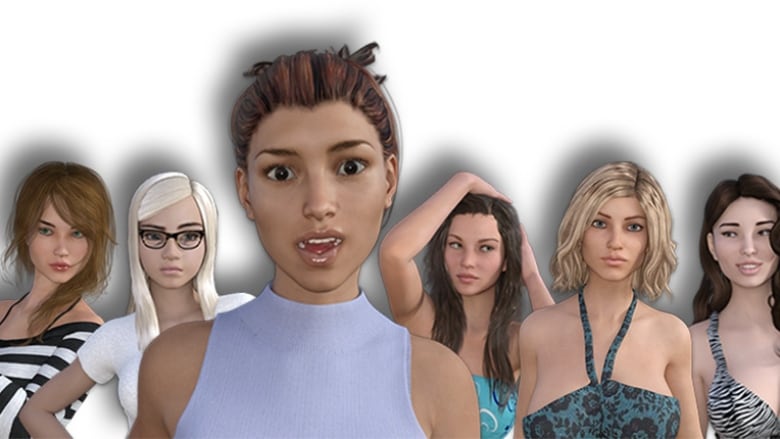Raunchy sex comedy game House Party briefly removed from PC store Steam
On-screen nudity censored before game was returned to shelves early Saturday

A sex comedy video game called House Party was briefly removed from Steam, North America's largest online store for PC games, sparking debate over its policies on nudity and sexual content.
In House Party, by Florida-based Eek! Games, you play a man socializing with the other mostly female party-goers. You spend most of your time flirting with impossibly buxom women in the hopes of an explicit, on-screen romantic encounter.
You'll also be given minor tasks by other attendees, like looking for the party host's phone or finding painkillers for a hung-over party-goer.
- Developer pushes boundaries of video game erotica
- Study finds men who harass women online are losers... at video games
Reaction to House Party has been mixed, but enthusiastic either way. Videos of popular YouTubers like Sean (jacksepticeye) McLoughlin and Canadian Matt Shea shouting incredulously at the game's salacious humour have been viewed millions of times.
Rock Paper Shotgun's John Walker, meanwhile, called it "misogynistic," while also panning its "ugly" visuals and the clunky, glitchy way characters move around the house.
"It's stupendously sexist and depressing, a sort of unaware failure of an alpha male simulator," he wrote.
Removed for 'pornography'
After about a month on Steam's digital shelves, House Party vanished. According to a blog post by Eek! Games' Bobby Ricci, Valve (the company behind Steam) said it was removed for "pornography" and wouldn't be allowed back until changes to the game's content were made.
Early Saturday, the game was re-added to Steam, but with the on-screen nudity censored. Players who buy it can still download a patch file from Eek! Games' site to reinstate all of the nudity that was removed. The file is named f—kcensorship.txt.
"I know there are many games with nudity, and there are also games with sex scenes as well, including really popular titles, so it's all rather confusing and I don't know exactly where the line is or what in particular I should be censoring," Ricci wrote.
"I understand where Steam is coming from," he added, criticizing what he called "an alarming societal perception of sex and nudity as something evil, even more so than murder, genocide, torture and gore which is widely accepted and prevalent in most other video games."

Ricci told CBC News that his dealings with Valve were initially very positive. "Valve was very supportive and helpful from the start, which is why the removal came as a shock to me," he said.
According to Gamesindustry.biz, one possible storyline in the game involves blackmailing a female character into stripping in front of the player, after finding nude photos on her phone and threatening to make them public.
Ricci told Gamesindustry.biz that the scenario was removed in a recent update. He said the change was made "to adjust it to our own tastes with how far we were willing to let this scene go, but that's a judgement call every developer should have the right to make and not be questioned."
Canadian gamer and cosplayer Azzyland posted a video featuring House Party on her YouTube channel, but she refrained from recording more after viewing these scenarios.
"House Party had a lot of sex scenes, and the nature of these scenes I found a bit too much for my audience — specifically scenes with shaming and blackmail," she said.
Few games with nudity
While Steam is home to many games with racy content, very few with nudity make it though, making House Party something of an anomaly.
Another exception, the award-winning erotic visual novel Ladykiller in a Bind by Toronto-based Christine Love, launched last year on other online stores, but was eventually approved for its uncensored release on Steam.
House Party had only been on Steam for about a month (it's been available on smaller digital stores since February) but, through it, brought in about 40 per cent of its roughly 35,000 sales so far.

"Of course, that percentage would grow greater if the game was still active on Steam, and in time, Steam would easily be a very high percentage of our sales," Ricci told CBC News.
Ricci says he plans to add options to play as a woman and pursue gay or lesbian romantic encounters, leading up to House Party's version 1.0 release; it's currently in an unfinished Early Access state.
Critical for indie creators
The implications of an independent studio or creator's game getting pulled from Steam can be significant. With over 125 million registered users, visibility on Steam can make the difference between profitability and failure.
Valve, also the makers of classic games like Half-Life and Portal, has earned reams of goodwill from gamers thanks to its regular sales that apply deep discounts to games.
But it's also been criticized for being a black box that rarely speaks to media or its community about its business decisions.
"Beneath the glassy smile of Good Guy Valve today lurks an altogether more cold and corporate beast, a textbook rent-seeker that is profiting from both hostile practices and a bizarrely customer-supported near monopoly on PC game sales," Tim Colwill wrote for Polygon in May.
CBC News asked Valve for reaction to this story, but has not received a response.

